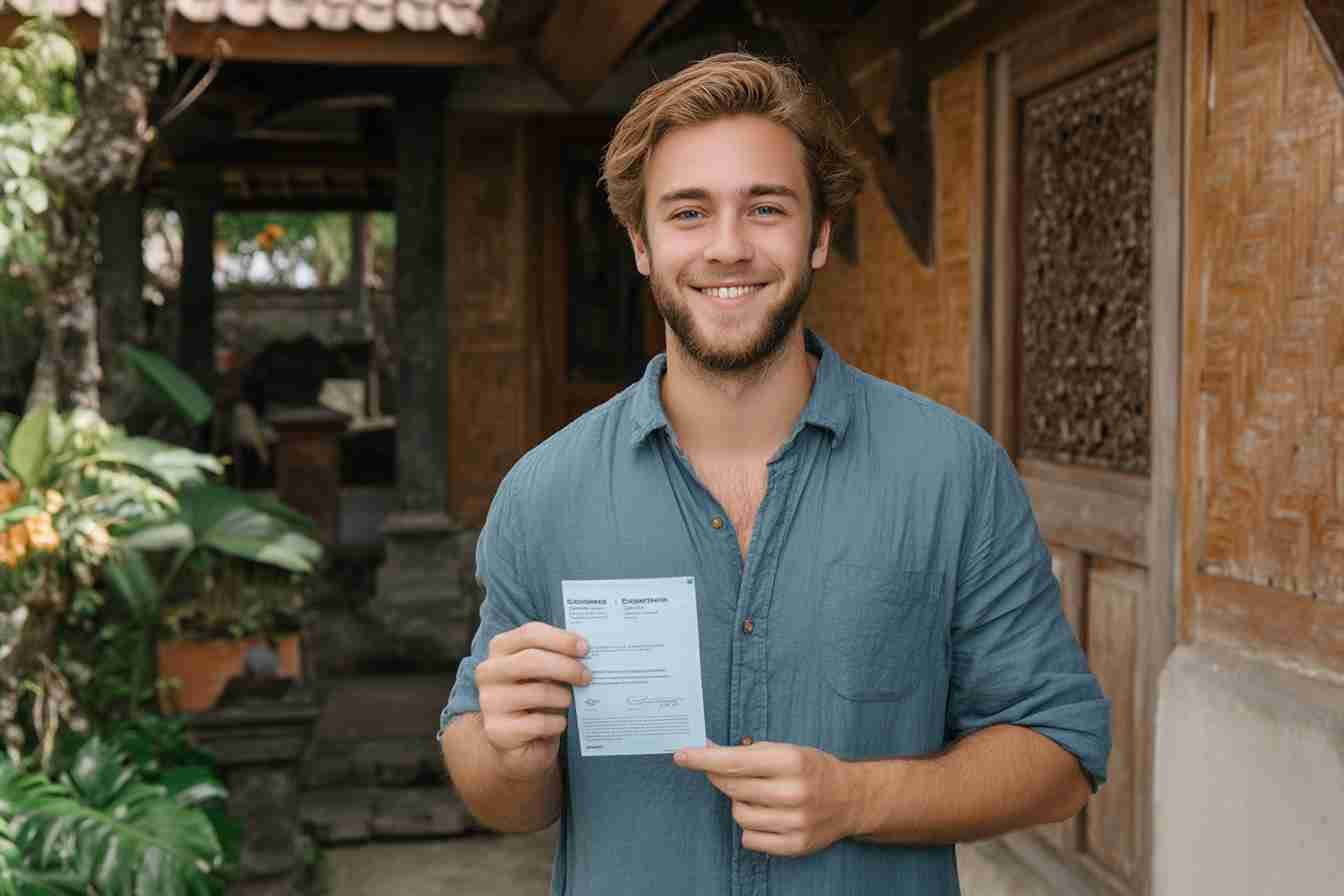
🅿️ Many foreigners dream of making Bali their long-term escape, but face uncertainty when it comes to staying legally beyond tourist or business visas. Figuring out how to live in Bali for years—without endless extensions—is a real challenge. 😕
🅰️ With changing visa policies and misinformation online, some expats risk overstaying or using the wrong permit entirely. Others give up on their Bali dream thinking there’s no legal way to live here comfortably long-term. 😣
🆂 Enter the Second Home Stay Permit—Indonesia’s new visa category designed for retirees, investors, and digital nomads who want to enjoy a long stay legally, without constant renewals or visa runs. ✅
🆃 “I spent years renewing short-term visas,” says Claire from France. “Once I qualified for the Second Home Visa, everything changed. I finally felt stable living in Bali without immigration stress.” 💬
🅴 For example, the Second Home Visa allows eligible foreigners to stay up to 5 or even 10 years, provided they meet financial or property-based requirements—such as showing proof of funds or property ownership in Indonesia. 🏡
🅰️ Curious if you qualify? This guide explains who the Second Home Stay Permit is for, how to apply, and why it could be the easiest way to build your life in Bali legally and peacefully. 🌴
Table of Contents
- Who Qualifies for the Second Home Stay Permit in Bali? 🛂
- How Long Can You Stay in Indonesia with the Second Home Visa? 📅
- What Are the Financial Requirements for the E33 Visa? 💰
- Can You Buy Property or Invest in Bali with This Visa? 🏠
- What Activities Are Allowed—and Not Allowed—on This Permit? ⚖️
- Required Documents and Application Process for the E33 Visa 📝
- What Mistakes to Avoid When Applying for the Second Home Visa 🚫
- FAQs About Long-Term Stay Permits in Bali for Foreigners ❓
Who Qualifies for the Second Home Stay Permit in Bali? 🛂
The Second Home Visa (E33) is designed for financially secure individuals who want to live in Indonesia long-term without working for an Indonesian company.
Ideal applicants include retirees, remote investors, and global citizens who can demonstrate financial stability. To qualify, you must show proof of living expenses of at least USD 2,000/month and commit to a financial investment or property purchase.
This visa is not for backpackers or short-term tourists—it’s for those ready to settle into island life for years. 🌊
How Long Can You Stay in Indonesia with the Second Home Visa? 📅
The visa grants an initial stay of 5 years, with an option to extend. This makes it one of the most generous long-term stay permits available in Southeast Asia.
Unlike tourist or business visas, there’s no need for monthly renewals, border runs, or constant immigration visits.
You also receive a multiple-entry permit, which means you can leave and re-enter Indonesia freely during the visa’s validity. It’s a perfect solution for those who want a base in Bali but still travel internationally. 🌏
What Are the Financial Requirements for the E33 Visa? 💰
Applicants must fulfill one of two main financial conditions within 90 days of entering Indonesia:
Deposit USD 130,000 into a state-owned Indonesian bank under your name, or
Purchase property in Indonesia valued at a minimum of USD 1,000,000
These assets demonstrate your commitment to residing in the country long term.
Additionally, you’ll need a valid passport (6+ months), proof of monthly expenses of at least USD 2,000, and a recent color photograph. 📷
Can You Buy Property or Invest in Bali with This Visa? 🏠
Yes! One of the unique advantages of the Second Home Visa is that it allows foreigners to legally purchase property in Indonesia.
This includes villas, apartments, and homes—as long as you meet the minimum investment value. You can also use the visa to support investment activities in local companies or real estate ventures.
However, note that while you can buy and invest, you cannot work or be employed under this visa. 📉
What Activities Are Allowed—and Not Allowed—on This Permit? ⚖️
You CAN:
Live in Indonesia for up to 5 years
Leave and re-enter Indonesia freely
Invest in property or local business ventures
You CANNOT:
Work for or be employed by an Indonesian company
Join political activities or run for public office
Automatically gain PR (Permanent Residency) or citizenship
Basically, the visa supports a lifestyle of leisure and private investment—not employment or activism. 🛋️
Required Documents and Application Process for the E33 Visa 📝
To apply for the Second Home Visa, you will need:
A valid passport (minimum 6 months)
Proof of income or living expenses (min. USD 2,000/month)
Recent color photo
Statement of commitment (property purchase or bank deposit)
Applications can be submitted through an Indonesian sponsor (like a visa agent) or via an official online portal. The process usually takes around 60 business days, and the visa cost is approximately IDR 35,000,000. 📢
What Mistakes to Avoid When Applying for the Second Home Visa 🚫
Some foreigners assume this visa grants work rights or a fast track to citizenship—it doesn’t. Others delay making the required bank deposit or property purchase, which can lead to visa revocation.
Be aware: all commitments must be fulfilled within 90 days of arrival. Working with a licensed visa agent can help you avoid delays, rejections, or compliance issues. ⛔️
FAQs About Long-Term Stay Permits in Bali for Foreigners ❓
-
Can I bring my family on a Second Home Visa?
Yes, spouses and children can be included as dependents.
-
Is the deposit refundable?
Yes, the USD 130,000 deposit remains yours and can be withdrawn if you leave Indonesia permanently.
-
Do I need to speak Indonesian?
Yes, but make sure they’re trusted and responsive. Read reviews or get referrals.No language requirement exists, but learning Bahasa Indonesia can improve your daily life.
-
What happens if I don’t meet the 90-day requirement?
Your visa may be canceled, and you could be asked to leave the country.
-
Is this visa better than a retirement visa?
If you meet the financial criteria, yes—the Second Home Visa offers longer stay and more flexibility.









